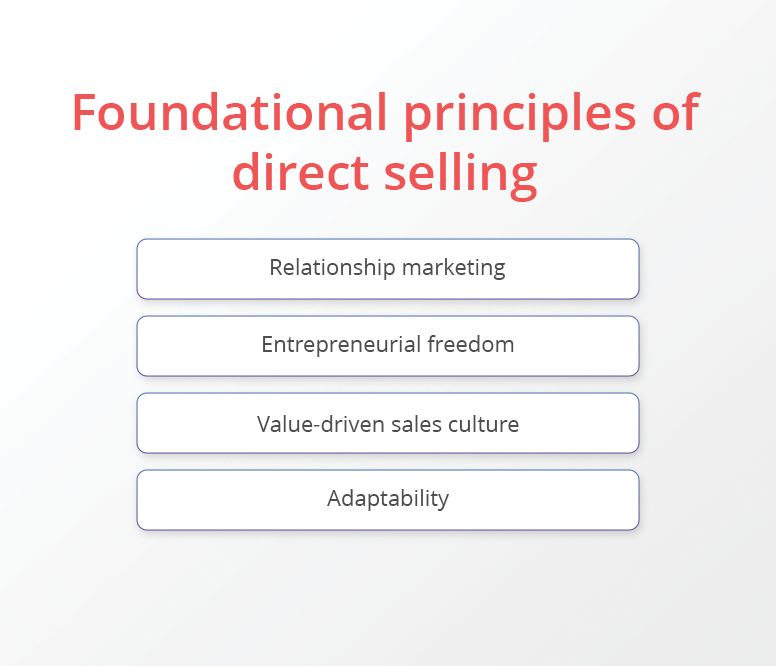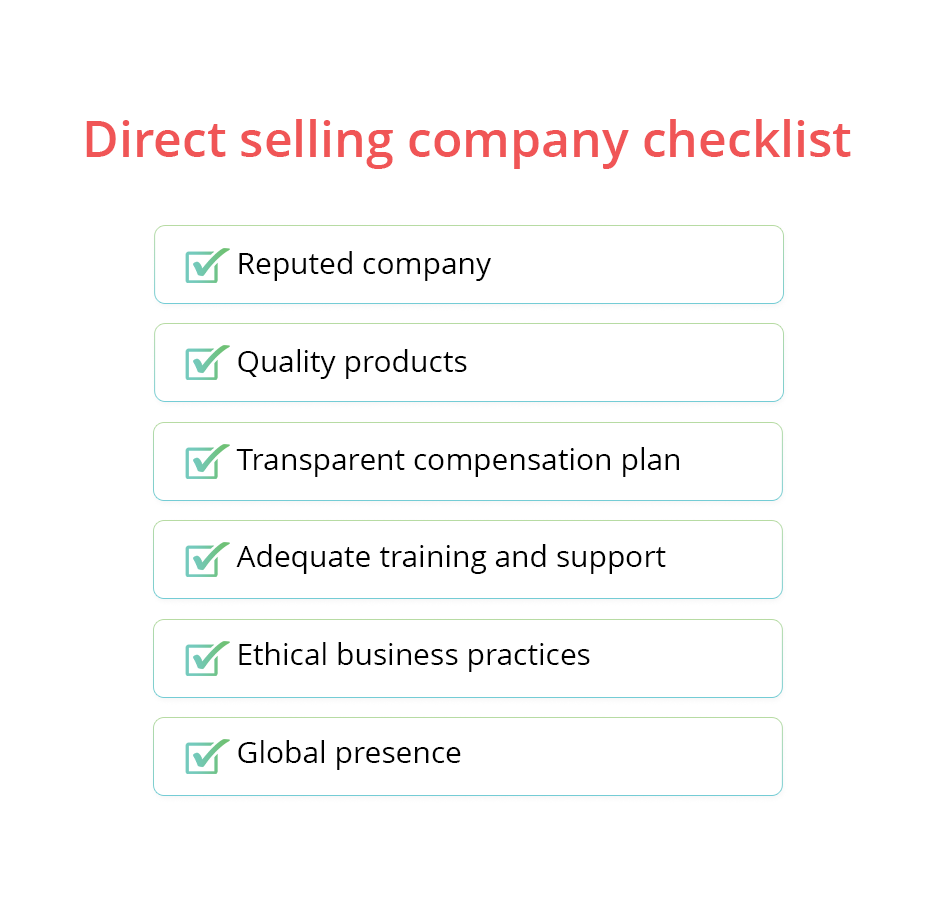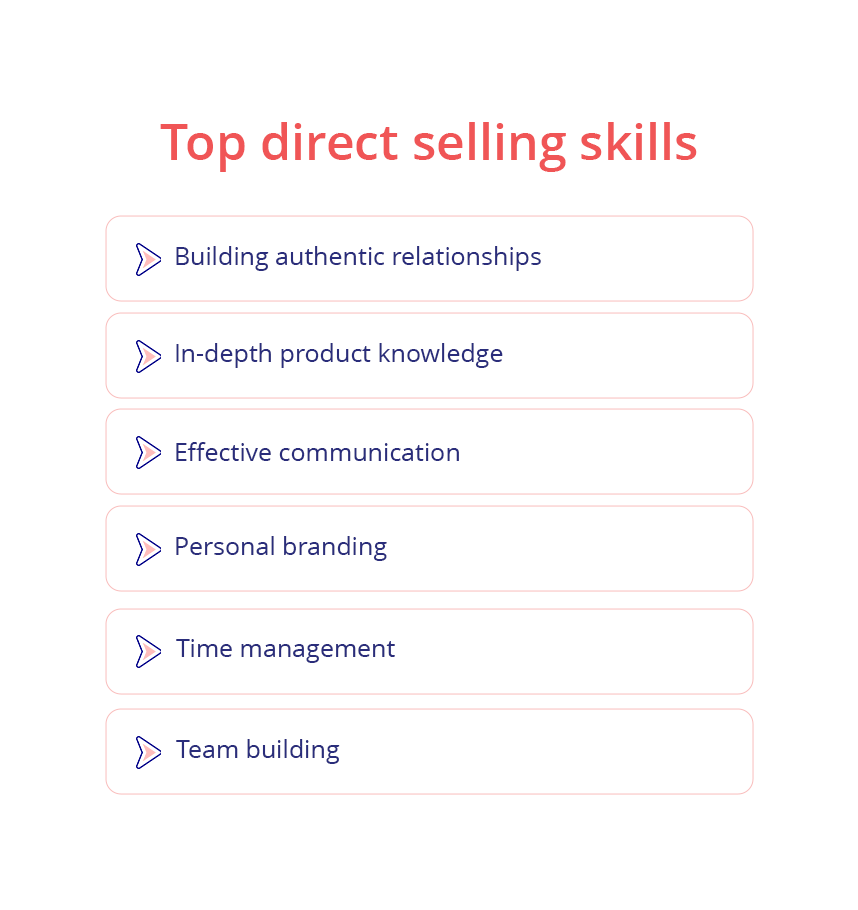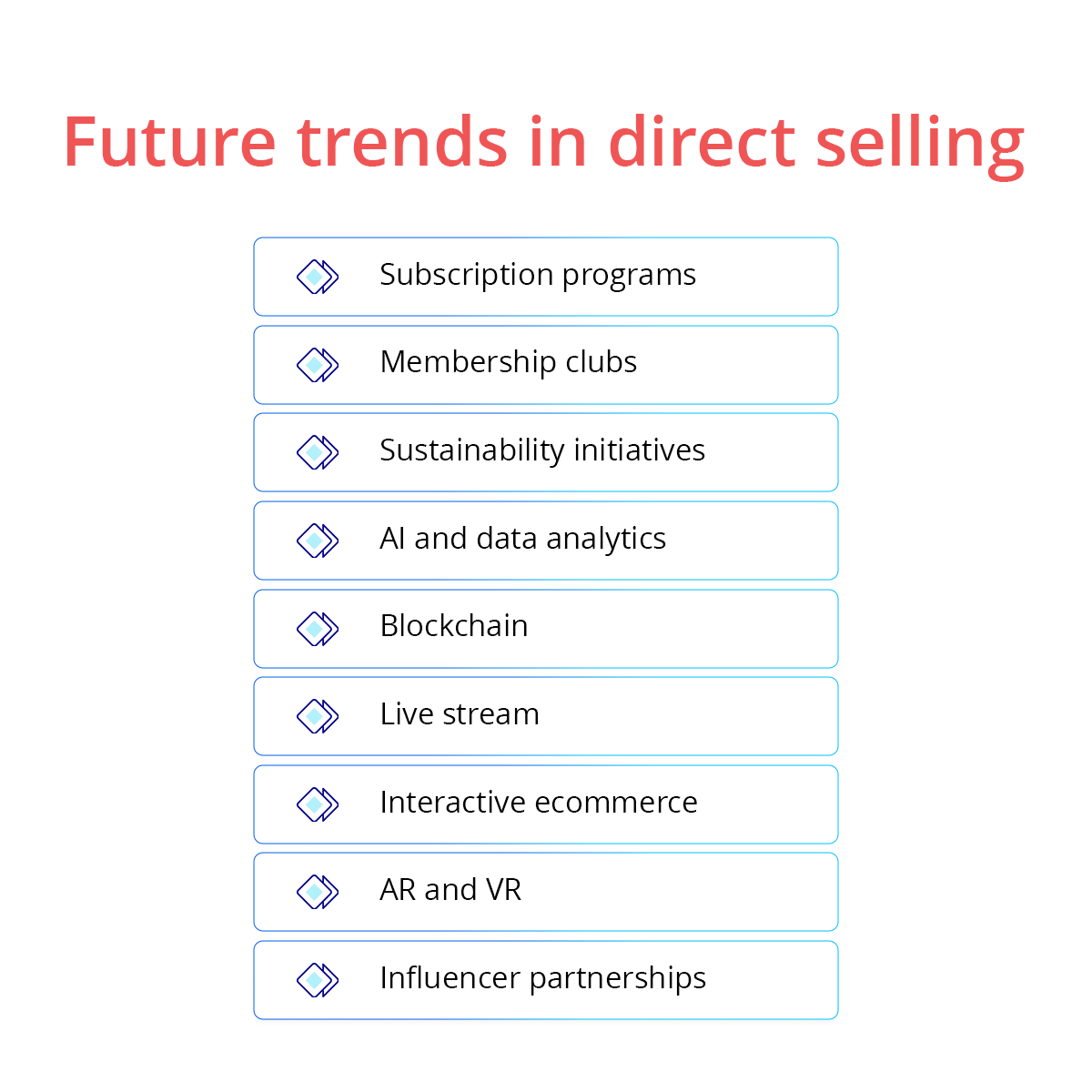Direct selling since its inception in the 20th century has been a marketing model full of life and energy. The aura that a direct seller creates with his prospects takes him forward through long-term customer relationships. Direct selling is an absolute blend of entrepreneurial freedom and trustful personal connections in a fast-growing market. Compared to a traditional retail setting, direct selling holds an upper hand for the fact that distributors build customer relationships, not just sales conversions. And that exactly differentiates direct selling from traditional marketing which involves sales-focused distributors, wholesalers and costly storefronts.
Face-to-face interaction, product education and building trust stands paramount in direct selling. This is what makes direct selling special as compared to other similar retail channels. Direct selling offers great opportunities for aspiring entrepreneurs and for those looking for home-based business opportunities. Opportunities for experienced sales professionals are also on the rise in direct selling.
Direct selling is a really flexible business model that lets sellers set their own schedules and build their own teams. It does not stop individuals to limit themselves to customers in a closed geographic location. Instead, direct sellers have the liberty to reach out to a wider audience across any geographic location. This has made direct selling a favored marketing model down the years. If we analyze the direct seller population across the globe, we can notice that it consists of home makers who yearn for a home-based business, retirees who wish to engage themselves in something productive, students who opt for a side hustle, professionals who aim to diversify their revenue streams and of course, ambitious individuals who want to build a successful career.
The global direct selling industry generated $167.7 billion in 2023, as highlighted by the WFDSA Annual Report.
Discover how we build resilient businesses with advanced MLM functionalities
Success in direct selling isn’t all about selling products or getting into the network of one of the top direct selling companies. Choosing a quality product and pitching it to make sales conversions is not the direct selling way.
Then what is it?
Establishing yourself as a successful direct seller takes a deep understanding of the industry, its business models, governing technology, customer preferences, ethics and trends. Epixel MLM Software shouldered the responsibility of guiding individuals successfully into the direct selling industry with this comprehensive direct selling guide.
The direct selling guide provides a complete detailing of direct selling—its evolution, business models, marketing strategies, regulatory information and technology trends like AI-driven personalization and blockchain applications. This article will get you ready to venture successfully into the direct selling industry with the needed insights and information to help you overcome the challenges and prevailing complexities.
Basics of direct selling – A closer look into the roots
What is direct selling?
Direct selling is a marketing model which involves selling products or services directly to the consumer. This retail setting eliminates the need for intermediaries. Direct selling does not require attractive storefronts, online marketplaces or expensive advertising campaigns to reach customers. It utilizes personal relationships to start with and extends to interpersonal networks with face-to-face demonstrations and virtual interactions in a remote setting. That is to say, direct selling works best both online and offline.
Brief history of direct selling
In the early days, direct selling as a business model was introduced to the society by door-to-door salesmen approaching individual households with innovative products or services. This soon gained momentum and underwent transformation to create many of the highly potential marketing models today like home parties and multi-level marketing.



Direct selling is deeply rooted in its tradition of creating trust-based personal relationships with customers. Even today when technology has geared up the buying and selling process, building relationships and personal connections stands supreme in direct selling. How sellers connect with customers has evolved over time. Today, direct sellers have bountiful opportunities to connect with their prospects and customers through online and offline mediums like webinars, social media, messaging apps and virtual meetings. All this together with the essence of personal touch makes direct selling special when compared to other marketing models.
Core principles of the direct sales industry

Relationship marketing
Direct selling is based on building personal relationships with customers treated with value and respect. Direct sellers build customer loyalty by analyzing customer needs, understanding their preferences, addressing their concerns and providing them with personalized recommendations. This approach improves customer trust and encourages repeat purchases.
Entrepreneurial freedom
Direct selling offer individuals the chance to start their own business with minimal startup costs. They can work their way to success with flexible working hours and by setting their own goals. This flexibility to set up a business and earn is what drives aspiring individuals to direct selling.
Value-driven sales culture
Direct sellers avoid being sales pushy rather educate customers on the benefits of products to help them through their purchase decisions. These sellers turned advisors deliver value to their customers bagging their loyalty and trust. Customers are moved by this credible advice and choose to stick on to them for the personalized services they offer.
Adaptability and mobility
Direct selling is a resilient business model that can adapt itself to any situation or challenges. Direct sales can happen anywhere, not necessarily in a retail setting. It could be a customer’s home, community event, over a call or through social media interactions. This reduces overhead costs and makes it convenient for distributors to reach their prospects through diverse channels.
Types of direct selling
Direct selling is considered a parent marketing model with other niche models under it. Even though these models exhibit direct selling characteristics, there are several other factors that draw the differentiation line.
Different types of business models in direct selling are
- Single-level marketing (SLM)
- Multi-level marketing (MLM)
- Party plan model
All these business models have features unique to direct selling but differentiated on the basis of its structure, compensation methods and strategic focus.
Single-level marketing (SLM)
Single-level marketing is a one-on-one marketing practice where the seller earns over his sales directly to a customer. There are no recruitment of teams or commission overrides from other sellers. Individuals who prefer relationship building prefer single-level marketing. This model does not require individuals to mentor or manage large teams. A seller in single-level marketing succeeds with his knowledge on products, personalized service and sales efforts.
Multi-level marketing (MLM)
Multi-level marketing as opposed to direct selling focuses on building a network of sellers who are paid multi-tiered commissions. Sellers earn commissions for their personal sales and a certain percentage of the sales of their network marketing team members. A legitimate MLM business focuses on quality products with a transparent compensation structure. A balanced MLM business rewards its salesforce for both their sales efforts and for their leadership qualities in mentoring and expanding their team. The sole focus of legitimate MLM businesses remains on developing quality products, ethical recruiting practices and building a mutually supportive team culture.
Party plan model
Party plan or home party selling involves setting up parties to introduce products, their benefits and eventually selling them to the party guests. Individuals hosting the parties are called party plan consultants. The home parties create a relaxed and social ambience which encourages interaction and impulse buying. Today, party plan also work best with virtual events and live parties through Zoom meetings, Facebook Live, interactive webinars. These technological advancements have added color to the party plan model and have widened its reach and convenience.
Key factors to consider before joining a direct selling company

Direct selling reserves a good opportunity for personal and professional development. But before you invest your time and resources in direct selling you will need to research thoroughly well into the company and the market. Let us analyze some crucial factors that will help you into making the right decision.
Company reputation
Run serious research about the company, its products, current financial state, market performance and its leadership team. Direct selling companies that are well established often have a strong support system where sellers can grow effortlessly. Recognized companies that run compliant businesses are safer to approach as you need not worry about legal penalizations or privacy concerns.
Product quality
The quality and diversity of products offered should outshine compensation structures and other attractions. Only a company that focuses on competitive and innovative offerings will stand the test of times and offer you consistent earning opportunities. Products devised should be able to provide real problems and offer value to customers because with genuine products comes customer trust.
Transparent compensation plan
One of the most complex processes to understand is the compensation structures, especially the multi-tiered ones. Be watchful of the company’s compensation structure because that eventually determines success in your direct selling career. A fair compensation plan is the one that is easy to understand and rewards you rightly for your sales efforts. It ensures that you grow along with the company and that every effort is rewarded in a fair and transparent way.
Avoid companies that ask you to focus on recruiting than bringing in sales. The compensation plans of these companies will be complex or have a secret nature that is hard to decode.
Training and support
Credible direct selling businesses focus on the growth and development of their salesforce. There are companies that invest their time, money and resources in training and upskilling their distributors. While this is a mutually beneficial process, not all companies support their distributors this way.
When choosing a direct selling company, learn about their support system because the right mentorship and training can provide you with consistent income opportunities. Companies that provide adequate training, sales tools and resources are keener on developing a highly skilled distributor team and joining them can help you grow professionally and update your skillset.
Culture and ethics
Look through the culture and values within the organization. A company that practices diversity and inclusion will be more comfortable to work with. A non-biased relaxed work environment is crucial to developing your career.
Ensure that the company prioritizes ethical business practices and compliance with industry standards. A company that contributes to society and the environment is indicative of trust and value.
Global presence
Internationally operating businesses are more growth-focused and offer you greater growth potential. So, research the company’s market reach to ensure a growth-oriented direct selling career.
Innovation and future outlook
A company with a foresight to develop through emerging trends and technological innovations is bound to stay competitive for the long-term. Such sustainable businesses will support your success and growth not only in the present but into the future too.
Identifying the legitimate
You can easily differentiate legitimate businesses from illegitimate ones by a close examination of certain underlying factors. Trace the company back to its history, analyze their track records, customer testimonials, product value and transparency in compensation plans. Companies with membership of regulatory bodies and associations such as the Direct Selling Association are bound by legal and regulatory standards.
Legitimate direct selling businesses do not adopt rigorous recruitment practices instead focus genuinely on product demand, customer satisfaction, salesforce profitability and sustainable business practices.
Keeping these factors in check will help you find a credible direct selling company that aligns with your goals and values and a safer direct selling career.
The 2025 DSN Global 100 list has 59 direct selling companies with annual earnings that goes beyond $100 million, and has collectively contributed around $64 billion to the world economy.
The direct selling value chain
Manufacturing and distribution
After manufacturing the products are procured by the distributors who then sell them to customers. The sales cycle here is short and does not require any retail setting or overhead costs involved in selling. This creates an advantage for organizations to set competitive pricing and distributors to achieve better profit margins.
Role of a distributor
Distributors in direct selling act as brand ambassadors rather than mere salesperson. They are expected to have extensive product knowledge, carry brand values, align themselves with industry standards and ethical business practices. Distributors identifies customer needs, provides personalized recommendations and after-sales support to establish long-term customer relationships. This also improves the distributor’s sales skills and contributes to their personal development as sales leaders, one of the benefits of direct selling.
Customer experience
Like any other business, compelling customer experience is paramount in direct selling. Businesses and their salesforce achieve this through delivering value rather than just products. Prompt follow-ups, exceptional service and real-time issue resolutions create a sense of trust and confidence that eventually builds up customer satisfaction. Customer-centric direct selling businesses prioritize customer experience as the driving factor of success and long-term sustainability.
Essential skills and strategies to succeed in direct selling

What are the crucial skills a distributor needs to have a successful direct selling career? Direct selling is well known for its low barrier to entry, flexible work schedules and earning opportunities. There are certain skills and strategies that can rev up your direct selling career.
Building authentic relationships
Relationship building is the cornerstone of direct selling. Direct sellers should establish customer relationships based on trust and empathy. It is more than just selling, it is a way of addressing the customer’s need with value-driven marketing and quality products. The three best qualities typical of a successful direct seller are active listening, personalized interaction and dedication.
Product knowledge
Direct sellers are viewed as an encyclopedia of the products they are selling. Not an exaggeration though!!!
Customers expect their distributor to be knowledgeable about every product they are selling. A direct seller must know it by heart—ingredients, benefits and results of the products they are selling. In-depth product knowledge helps distributors answer any customer queries or concerns with confidence.
Communication and story telling
Effectively communicating with the customer is important to gain their confidence and accelerate conversions. The art of storytelling in product sales brings a humane aspect to the products or services. Direct sellers can color up their narratives with relevant success stories, customer testimonials and before-and-after user experiences. This can help potential customers visualize the impact of products on their own lives.
Personal branding and marketing
Personal branding is not a mark of luxury or showoff anymore. The pace at which competitions are increasing, it becomes more important than ever to brand yourself in uniqueness and value. Create your online presence with a personal website, blogs and online community presence. Try to maintain consistent logos, colors and content across platforms. Educational, inspirational and mentorship content can engage followers and create a social network that is beneficial for your direct selling business.
Time management and goal setting
Direct selling is often chosen for the flexibility it offers in terms of work hours and earnings. Most individuals choose direct selling as a substantial income opportunity. But whether it be a side hustle or a mainstream career, direct selling should be given due weightage just as any other business. Setting achievable yet consistent goals and achieving them through short actionable steps can ensure faster goal completions.
Tracking individual progress and setting priorities can help manage time and better organize yourself.
Team building
In an MLM setting, leadership and network building skills are crucial. You will need to work for yourself and your team. Supporting and guiding your team with appropriate training sessions and mentorship programs can help you build highly productive teams. In a business model like MLM, success of your team determines the level of your success.
Technology in direct selling
The advent of technology has created new opportunities for direct selling businesses and their salesforce. Innovative tools and platforms have simplified direct selling processes and made it easier for distributors to connect with customers and their teams. It has redefined every factor from engagement to experience.
Online platforms and virtual events
Social media platforms like Facebook, Instagram and TikTok have brought in possibilities of social selling and community selling widening the reach of businesses and accelerating conversions for distributors. Just that distributors must stay informed about the social selling trends in these platforms to adapt and succeed.
Live streaming services and webinar tools like Zoom and GoToWebinar are great tools to host virtual product demos, Q&A sessions and mentorship program. These tools help collect instant feedback, live interaction and expand the brand’s global reach.
Ecommerce and referral programs
Ecommerce integration and customer referral programs have created a convenient shopping experience for customers. The joy of shopping online and automated product tracking and delivery enhances buying experience and thereby boosts customer retention.
CRM and data analytics
Customer Relationship Management systems centralize customer information, sales and marketing processes. These analytics-integrated platforms can help businesses identify fast-moving products, seasonal trends and customer preferences. CRM system segments customers based on their buying habits and product preferences. This makes it easier for businesses to run targeted marketing approaches.
Direct selling software
Direct selling software platforms offer businesses comprehensive solutions to manage core business processes and extensive salesforce teams with innovative tools and well-outlined strategies. This enterprise management platform simplifies commission calculations, genealogy management, supply chain management and customer service through AI-powered automation.
Core features of a direct selling software
-
Compensation plan management
The compensation plan management module ensures flawless performance and automated commission calculations. The system makes real-time payouts through secure payment methods and eliminates overpayments.
-
Mobile app
User-friendly mobile app empowers distributors and businesses to communicate and oversee business operations. Users can track sales, monitor team performance, access training materials, and place orders anytime anywhere. Real-time notification will keep them current on business performance.
-
Sales enablement tools
Promotional tools like landing pages, ad banners, interactive product catalogs and other multimedia elements ensure effortless marketing across channels. Users can easily share product information during in-person events or virtual calls with sharing-enabled platform.
-
Analytics and reporting dashboards
State-of-the-art dashboards display business performance with key performance indicators (KPIs) to derive proactive insights. These insights put into action can help businesses in data-driven decision making. Businesses can generate reports on various metrics like top performers, product trends and customer segments to devise targeted strategies accordingly.
-
Compliance and security
Direct selling platforms are built to align with the legal and regulatory standards of the direct selling industry. These platforms are built on a secure architecture to manage compliance and safeguard business-critical data and financial transactions.
Influencer collaborations
Direct sellers and businesses can partner with influencers or micro-influencers to expand their reach. These social media ambassadors can take your brand and products to a wider audience through their vast follower base. This digital trend, if worked out well, can bring authentic brand endorsements from the most celebrated and trusted voices.
Future trends and innovations in direct selling
Technology and trends are two major factors that are constantly evolving. Customer preferences and interests change and to cope with it groundbreaking innovations happen.
Direct selling companies and distributors who sense the trend align themselves with the innovations to stay competitive and relevant.

Subscription programs
Subscription-based direct selling businesses will gain prominence for the consistent revenue and customer retention rates it offers. It offers convenience for customers as they do not have to reorder the same products again and again. For businesses this brings repeat purchases, revenue and long-term customer relationships.
Membership clubs
Brand-based premium memberships and privileges will be welcomed by customers for the sense of community they bring. Direct selling companies with membership clubs will have close-knit customers and distributors in their value chain. Exclusive offers and membership perks will keep customers and distributors feeling privileged, adding up to their brand loyalty.
Sustainability initiatives
CSR initiatives have already emerged as a trend among direct selling businesses and a differentiating factor in competition. It also plays a part in influencing the purchase decisions of customers, especially the younger generations. Direct selling brands who switch to sustainable packaging, ethically sourced ingredients and transparent supply chains will have a special place among customer favorites.
Personalized customer experiences with AI and data analytics
Personalization will hit new roads with AI and data analytics taking charge in direct selling. These emerging technologies will act as relationship binders by predicting customer needs even before they realize it. AI-driven tools powered by analytics will analyze past data sets for past purchases, browsing history and demographic data to make product recommendations, tailor promotions and personalized interactions.
Blockchain for authenticity and transparency
Application of blockchain technology in direct selling covers various processes such as product quality checks, supply chain, payments and compensation. Blockchain ensures transparency and the much needed security to keep data and transactions safe. Blockchain verification of product quality standards help identify counterfeit products, ingredients and other additives. This strengthens brand trust and builds brand integrity.
Live selling and interactive ecommerce features
Modern direct sales platforms support live selling like home shopping channels on social media. Distributors can make real-time product demonstrations and address customer queries instantly. “Buy Now” buttons integrated to these live streams make shopping more engaging and convenient for buyers.
Interactive ecommerce features like cross-selling and upselling also add to the convenience of shoppers and influence their purchase decisions in real-time.
Augmented Reality (AR) and Virtual Reality (VR)
AR and VR technologies are already creating waves in direct selling ecommerce with virtual try-ons and staging of furniture and equipment. The interactive and immersive experience presented by these technologies guide customers to rule out uncertainties and create memorable shopping experiences.
Influencer and micro-influencer partnerships
Social media influencers and celebrities have a larger follower base with the majority trying out their recommendations or at least considering their opinions. Micro-influencers on the other hand connect with specific communities to share relevant thoughts and suggestions. Identifying the right ones to include in your marketing strategy is key but it is also important to find ones that indulge in ethical marketing practices.
Forecasting the changes and embracing the trends and innovations will ensure that businesses stay competitive even amidst the changes.
Regulatory and ethical considerations in direct selling
Direct selling as a business or a career needs careful consideration of ethical and compliance factors that rule the industry, countries of operations and international trade policies.
Compliance with local laws
Every direct selling market will be governed by region-specific laws and policies across various business aspects like operations, sales, taxes, compensation and consumer protection. Understanding these regulations and keeping yourself aligned to it will save you from legal penalizations and hefty fines and will contribute toward building a trustworthy business.
Ethical selling practices
Direct sellers must stick to ethical sales practices and companies must ensure that their salesforce does it right. Approach customers with honest product claims and avoid misleading them into buying your product. Offer transparent compensation details and fair pricing to showcase your commitment and brand integrity.
Industry guidelines and associations
Autonomous bodies such as Direct Selling Association (DSA) regulate direct selling businesses in each country by ensuring ethical standards and best network marketing practices. Respecting the guidelines and putting them into practice shows your professionalism and responsibility. Memberships in credible organizations like DSA make your customers feel confident about your company and its products.
Building long-term trust
Trust and transparency are the cornerstones in direct selling. Delivering value, upholding ethical business practices and high customer service standards build brand trust and favorability. This in turn will bring in more referrals, loyalty and sustainable success.
Direct selling challenges and ways to overcome
Handling rejections
Even when rejection is an obvious part of sales, not all sellers can handle this well. Direct sellers must accept rejections as feedback to analyze what needs improvement. Stop and think why did the prospect say no?
Lack of need?
Price concerns?
Timing issues?
Identifying the right reason and addressing them refines your approach and increases future conversion rates.
Market saturation and competition
Competition increases as more people join the direct selling industry or the sector you are operating in. Several alternatives for the same kind of product also accelerate competition. Businesses and sellers must learn to differentiate themselves by providing exceptional service, specializing in niches and with innovative marketing techniques. Direct sellers must train themselves to get past the obstacles with in-depth product knowledge and personalized prospecting approach.
Time management and preventing burnouts
Balanced prospecting and setting easily achievable goals can ease the stress and help you to become more productive. Direct selling companies should engage their salesforce with events, team training and brand communities that can help ward off their anxiety and skill gaps.
Staying motivated and successful
Direct selling is never a one-night-show. It comes with persistent efforts, dedication and an undying spirit to succeed. Motivate yourself with small milestones, learn from failures and remain patient. Attend mentorship programs, take inspiration and guidance from leaders and set your career plan. Move forward slowly but steadily to ensure consistent success.
Conclusion
Direct selling is much more than a sales model. It symbolizes the warmth of personal connections, trust, authenticity and empowerment. It is an arena where determined and hard working individuals can find themselves basking in success. This comprehensive guide has covered every aspect of direct selling from its foundational principles to the future of technology and trends.
Following this guide will give you a fair outlook into the possibilities direct selling has in store for you, the skills you need and the expectations you can hold. Remember, in direct selling setting yourself up ethically and remaining open to rejections and change will bring you growth and success.
As you move toward a hopeful direct selling future remember that success comes through continuous learning and adaptation.









Leave your comment
Fill up and remark your valuable comment.